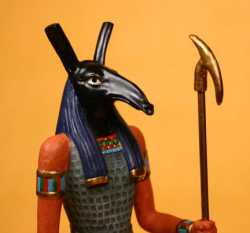[21 / 10 / ?]
Quoted By: >>21385688 >>21385691 >>21385695 >>21385696
>Genesis 4:25 names him as the third son of Adam and Chavah (Eve), usually known in English as Seth
>Numbers 24:17 gives Shet as a tribe living next to Mo-Av, probably the nomadic Sutu noted in Assyrian and Babylonian inscriptions
>Shat = "columns", from the root Shayit (שית); metaphorically used to mean "princes", "nobles" (cf Psalm 11:3), in the same sense that English talks about people who are "pillars of the community"
>Also used for "buttock" (Isaiah 20:4 and 2 Samuel 10:4), which I take to be in some way similar to Shechem (שכם) = "shoulder": a portion. i.e the part that was eaten by the priests after the sacrifice
>Shet is the Yehudit pronunciation of Set, the Mitsri (Egyptian) god also known as Sutekh, who killed Osher (Osiris) and who, particularly in later Egypt, was associated with the donkey. You can follow the connection with Set and the donkey-cult in the David-Sha'ul story in my novel "City of Peace". You can follow the connection with Set as the red-haired god who provides an adversary to the Osiric "good-guy" in any one of several Biblical myths: Kayin and Havel, Yishma-El and Yitschak, Ya'akov and Esav...
>The Hyksos god Typhon is also identified with Set. The Hyksos came from Armenia or beyond (probably Hittite at their earliest known source) via Cappadocia, Ashur and Kena'an (Canaan), around 1780 BCE (which should enable us to date the Yoseph stories). Their western capital was at Pelusium on the Canopic arm of the Nile delta in northern Egypt (effectively Goshen); their eastern capital at Avaris, which most definitely was in Goshen. They were likely allies to the Byblians of Phoenicia, who had a trading station at Pelusium. The god of Byblos was Adonis. The Egyptians called Byblos the Land of Negu, and imported trees and timber from there
>Numbers 24:17 gives Shet as a tribe living next to Mo-Av, probably the nomadic Sutu noted in Assyrian and Babylonian inscriptions
>Shat = "columns", from the root Shayit (שית); metaphorically used to mean "princes", "nobles" (cf Psalm 11:3), in the same sense that English talks about people who are "pillars of the community"
>Also used for "buttock" (Isaiah 20:4 and 2 Samuel 10:4), which I take to be in some way similar to Shechem (שכם) = "shoulder": a portion. i.e the part that was eaten by the priests after the sacrifice
>Shet is the Yehudit pronunciation of Set, the Mitsri (Egyptian) god also known as Sutekh, who killed Osher (Osiris) and who, particularly in later Egypt, was associated with the donkey. You can follow the connection with Set and the donkey-cult in the David-Sha'ul story in my novel "City of Peace". You can follow the connection with Set as the red-haired god who provides an adversary to the Osiric "good-guy" in any one of several Biblical myths: Kayin and Havel, Yishma-El and Yitschak, Ya'akov and Esav...
>The Hyksos god Typhon is also identified with Set. The Hyksos came from Armenia or beyond (probably Hittite at their earliest known source) via Cappadocia, Ashur and Kena'an (Canaan), around 1780 BCE (which should enable us to date the Yoseph stories). Their western capital was at Pelusium on the Canopic arm of the Nile delta in northern Egypt (effectively Goshen); their eastern capital at Avaris, which most definitely was in Goshen. They were likely allies to the Byblians of Phoenicia, who had a trading station at Pelusium. The god of Byblos was Adonis. The Egyptians called Byblos the Land of Negu, and imported trees and timber from there

